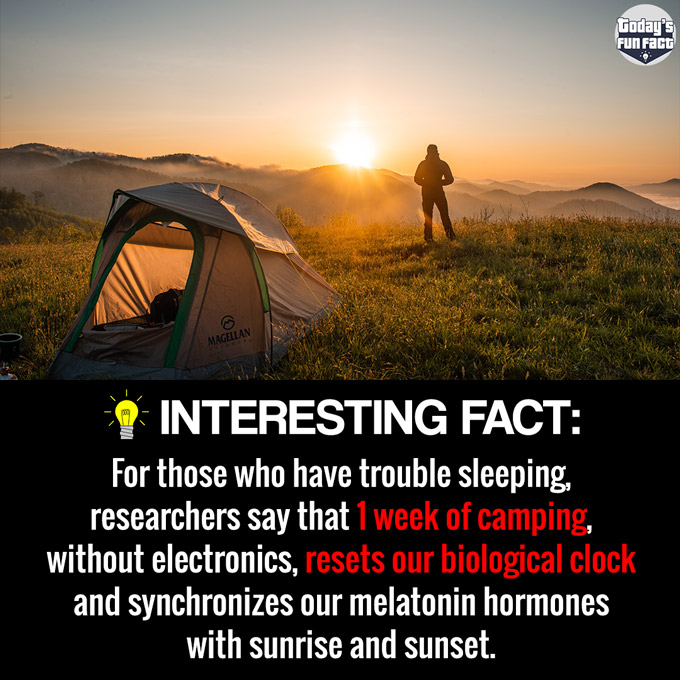
For Those Who Have Trouble Sleeping – Try Camping Graphic © todaysfunfact.com. Background photo: Pexels (PD), Pixabay (PD)
Looking to improve your out-of-whack sleeping habits? The solution could lie in the great outdoors. More specifically, living by the sun’s schedule. It makes perfect sense when you understand why.
A study by scientists at the University of Colorado suggests that going on a camping trip away from artificial light sources syncs your biological clock to the sun’s rising and setting. This restores your internal clock to its natural rhythm—helping you sleep earlier and wake up early feeling refreshed.
In other words, communing with mother nature helps reset your sleep cycle.
For a large chunk of our history, this was the case. Humans woke up at sunrise and went to bed shortly after sunset. This was the norm until the incandescent light bulb—and the inventions after it—came along. Suddenly we found ourselves scrolling through our Instagram feeds giggling at memes at 3am when you have to be in the office at 8am.
Understanding Your Biological Clock
Your feeling of sleepiness or alertness is determined by a biological master clock.
In a healthy sleeper, the master clock sends signals that trigger certain body processes to generate alertness upon light exposure in the morning. As the sun sets, this clock initiates the release of a hormone known as melatonin. As melatonin levels rise, you get sleepy. And as they drop towards the morning, wakefulness kicks in.
The problem is that our modern society and artificial light mess up our biological clock. There’ll be instances when your melatonin levels are still high after sunset because your biological night started late. And this is where the study by the University of Colorado comes in.
Go Camping for Better Sleep
According to Kenneth Wright from the abovementioned study, “When people are living in the modern world — living in these constructed environments — we have the opportunity to have a lot of differences among individuals. Some people are morning types and others like to stay up later. What we found is that natural light-dark cycles provide a strong signal that reduces the differences that we see among people—night owls and early birds—dramatically.”
The study followed 8 individuals, monitoring their melatonin levels before and after a week-long camping trip in the Colorado wilderness. The findings showed that the participants’ internal clocks synched more to the sun’s movement after the trip.
Wright added: “We weren’t studying people who had sleep difficulties. The amount of sleep they got did not change. What changed was the timing of their sleep and the timing of their [internal] clock relative to when they slept.”
Takeaway? Increase your exposure to natural light for better sleep!
